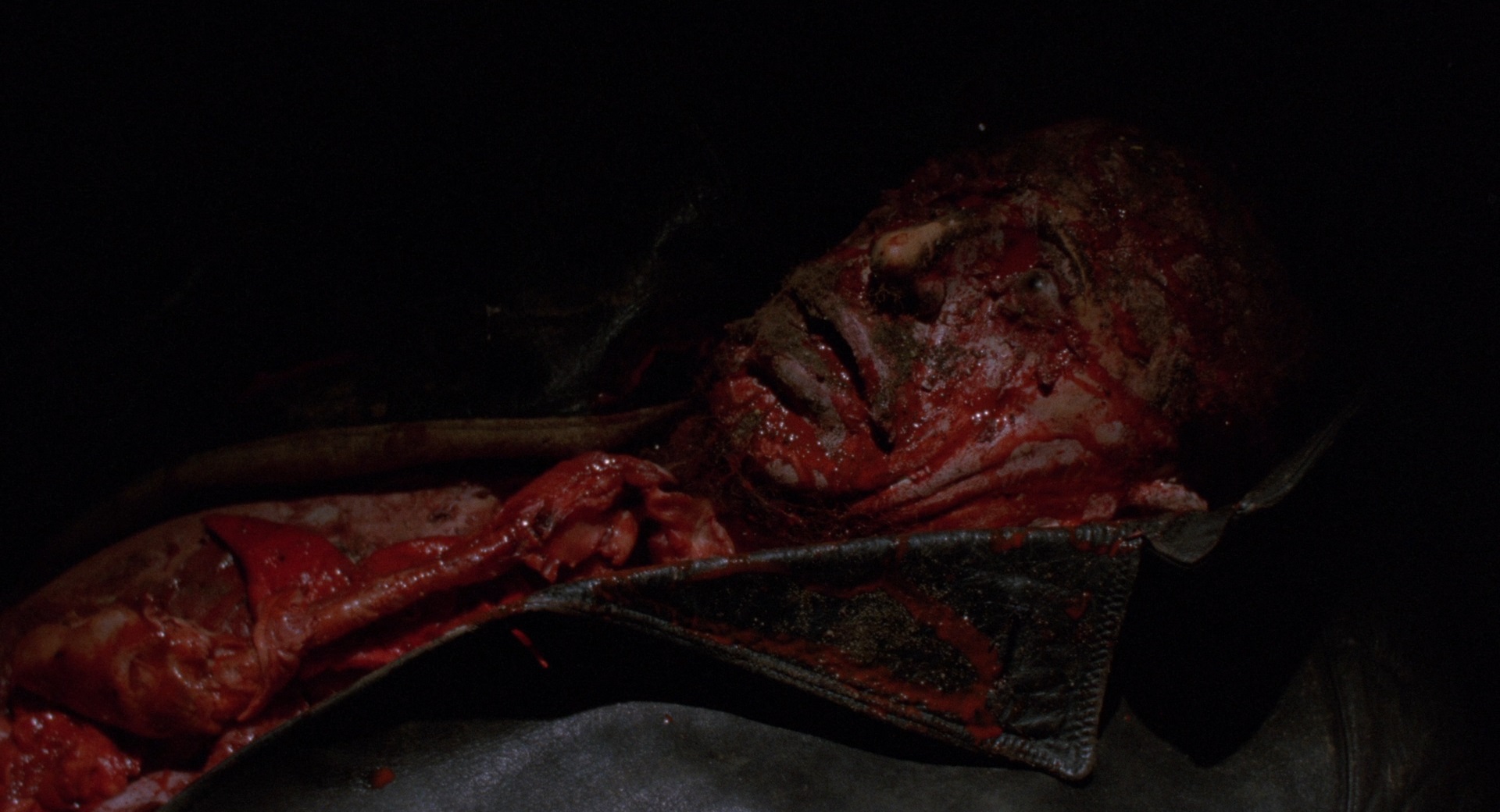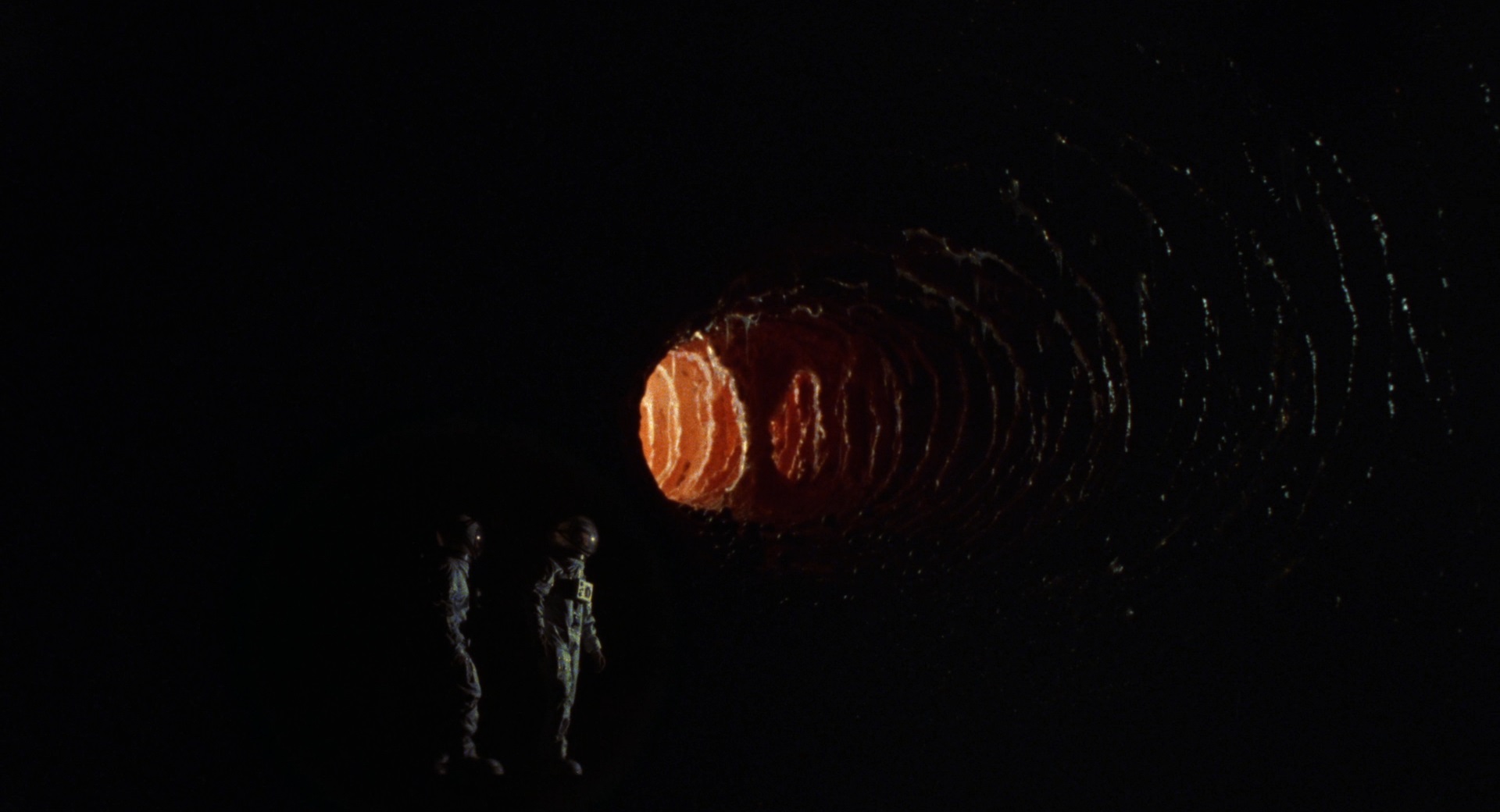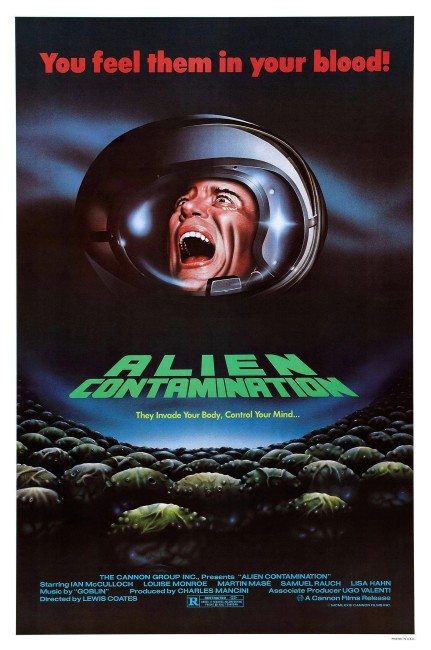aka Contamination
(Contamination – Alien Arriva Sulla Terra)
Italy/West Germany. 1980.
Crew
Director/Story – Luigi Cozzi, Screenplay – Luigi Cozzi & Erich Tomek, Producer – Claudio Mancini, Photography – Giuseppe Pinori, Music – The Goblin, Special Effects – Giovanni Corridori, Alien Cyclops Design – Claudio Mazzoli, Alien Cyclops Constructed by Giorgio Ferrari, Production Design – M. Antonello Geleng. Production Company – Alex Cinematografica S.r.l./Bathonia Film GmBh/Lisa Film GmbH.
Cast
Ian McCulloch (Commander Hubbard), Louise Marleau (Colonel Stella Holmes), Marino Mase (Lieutenant Tony Aris), Siegfried Rauch (Hamilton), Gisela Hahn (Perla de la Cruz)
Plot
Police investigate as the freighter The Caribbean Lady arrives in New York harbour with all of its crew dead, their stomachs having exploded. In the hold, they find a shipment of coffee crates containing eggs, which erupt, spraying the police and in turn causing them to explode. Colonel Stella Holmes takes over to investigate as the sole survivor, detective Tony Aris, is quarantined. It is determined that the eggs are of alien origin. Holmes realises that the eggs are remarkably similar to those reported seen in a cave on Mars during a manned expedition led by Commander Hubbard. She was part of a panel that deemed Hubbard crazy after his colleague Hamilton denied seeing anything. Holmes drags Hubbard out of where he lives in burned-out seclusion. She, Hubbard and Aris travel to Colombia to trace the source of the eggs. There they discover a coffee factory where Hamilton, his mind controlled by the aliens, is now masterminding an operation to breed more eggs.
Luigi Cozzi, sometimes known under the Anglicised name of Lewis Coates, is one of the hacks of the Italian film industry. Cozzi emerged as a Dario Argento associate and had a career throughout the 1970s and 80s with films such as Starcrash (1978) and Hercules (1983), both of which attained a reasonable international profile, as well as the lesser likes of The Adventures of Hercules (1985), Paganini Horror (1989) and The Black Cat (1990).
It is abundantly clear that Alien Contamination was designed as a rip-off of Alien (1979) – indeed, Alien Contamination was so quickly thrown together that it managed to be one of the first Alien rip-offs to appear in theatres. As with many Italian horror films made around this era, Alien Contamination is low on small matters like plot and basic credibility. It has been construed almost entirely around either cheap lurid shock effects and/or scenes of extreme gore. As was the case with Italian horror films of the era, one or two minor international actors have been brought in to sell the film abroad – in this case, British actor Ian McCulloch, best known for tv’s Survivors (1975-7), who appeared in several other Italian genre films around the same time.

Luigi Cozzi is a professed science-fiction fan – even so, his films have much nonsensical science and science-fiction in them. Cozzi, for instance, has Ian McCulloch state quite inaccurately here that H.G. Wells envisioned Martians as flying monsters, whereas in fact the Martians in Wells’s The War of the Worlds (1898) do everything except fly. [Cozzi is perhaps thinking of the George Pal film version The War of the Worlds (1953), which depicted the Martian war machines, but not the Martians themselves, as flying].
Occasionally, there is some amusingly sarcastic dialogue, like where Louise Marleau tries to recruit Ian McCulloch to help them:– “What do you want to know,” he snarls, “How many times a week I screw?” “If you’re in this kind of condition, it’s obvious you couldn’t get it up if you had a crane,” she retorts. Later Ian McCulloch and detective Marino Mase discuss Louise Marleau:– “Is something wrong with her or is she just married?” “Yeah, to a test tube and a whip.”
Alien Contamination is extremely gory – particularly during the opening scenes, which feature bodies with exploding stomachs and even exploding lab rats. Like many Italian horror films of this period, there is little to recommend it outside of the gore effects. At least to his credit, Luigi Cozzi makes the film hum along with a degree of technical competence. He also appears to have gone and shot on location in the real Colombia (or some equivalent) during the latter third of the show.

One of the big minuses is that the alien eggs are only a vague threat. The eggs themselves have little menace, other than the opening scene and another scene where an egg is locked inside a shower with Louise Marleau. Most of the film is taken up with mundane drama about proving Ian McCulloch’s sanity or trailing the smugglers – there is nothing to the film as there was in Alien with a nasty creature prowling the corridors picking off the cast.
It is also hard to work out what biological purpose the eggs have – all they ever seem to do is cause host stomachs to explode, they never actually seem to hatch or give birth. If anything, Alien Contamination looks like it started out as a drug-smuggling film and ended up being converted to an Alien copy with the injection of a handful of splatter and science-fiction scenes – we even get scenes where the smugglers are seen harvesting the eggs in poppy fields.
Luigi Cozzi first made the low-budget SF film Tunnel Under the World (1968). He started in the industry as an assistant director to Dario Argento, co-writing Four Flies on Grey Velvet (1971). He also directed the giallo The Killer Must Kill Again (1975); Starcrash (1978), an enterprising ripoff of Star Wars; Cannon Films’ Hercules (1983), The Adventures of Hercules (1985); the giallos Paganini Horror (1989) and The Black Cat (1990); and Blood on Melies’ Moon (2016), as well as several documentaries about Argento. FantastiCozzi (2016) is a documentary about Cozzi.
Trailer here


